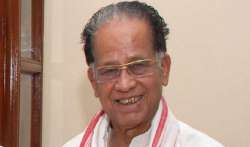Narasimha Rao didn't respond to my letter on Babri: Tarun Gogoi
New Delhi: P.V. Narasimha Rao instituted several reforms during his tenure as prime minister, but "he did not have a hold over" his Congress party. And when Tarun Gogoi, who was the food minister, wrote

New Delhi: P.V. Narasimha Rao instituted several reforms during his tenure as prime minister, but "he did not have a hold over" his Congress party. And when Tarun Gogoi, who was the food minister, wrote to him criticising his handling of the Babri mosque demolition, he failed to get a response.
Assam Chief Minister Gogoi, recalls in his book 'Turnaround - Leading Assam from the Front', how he felt that the handling of the December 1992 Babri Masjid demolition by then prime minister Rao was "not appropriate".
"Narasimha Rao was a modern man, and several reforms were initiated during his tenure. He did not interfere with the work of his ministers. As food minister, I took most of my decisions myself," writes Gogoi, who is Assam chief minister since 2001.
The book is scheduled to be launched here on Saturday.
"However, Rao did not have a hold over his party. I feel the way he handled the Babri Masjid demolition was 'not appropriate'. Breaking all conventions as a minister, I even wrote a letter telling him that he should not have allowed this to happen. He should have taken the leaders of the minority community into confidence," Gogoi writes.
"I was very critical as the demolition alienated the minorities from us. However, he did not respond to my letter."
Gogoi also recalls that as food minister in the Rao government he allowed the entry of multinational companies Coca-Cola and Pepsi into India.
"Our government decided to open up the economy to foreign investments, and I took a decision to allow the entry of Coca-Cola and Pepsi into India. I felt it was a good opportunity to tell the international community that the Indian economy was opening up and willing to engage with global businesses," Gogoi writes.
"The opposition was vehement in its criticism, but I stood firm. In 1993, I was shifted to the union food processing ministry, through which I gained great international exposure," he writes.